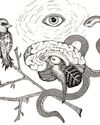
When we examine any particular belief or partic-ular line of reasoning, we need to compare it with some accepted standard to test whether or not it is sound. But herein lies a problem, for this accepted standard must itself be examined for its validity; and the standard used to examine that standard also examined, and so on, and so on. In attempting to justify a means of examination of ideas, evidently one is led to a potential infinite regress, since every examination apparently involves an accepted standard, but every accepted standard requires an examination of its own validity to justify its own use... Is there any foundation upon which we might properly examine our ideas?
This issue is already found in ancient sceptical thought, most notably in the writings of Sextus Empiricus (160-210 AD). It also illustrates a problem that GWF Hegel considers in his Phenomenology of Spirit (1807). As Hegel explains, whether the accepted standard for testing ideas be science or some other means of examination, if it is not itself examined, then a valid examination simply will not occur. In other words, if an examination of a standard does not occur, then one holds that particular standard by mere assumption.
Diese Geschichte stammt aus der February/March 2021-Ausgabe von Philosophy Now.
Starten Sie Ihre 7-tägige kostenlose Testversion von Magzter GOLD, um auf Tausende kuratierte Premium-Storys sowie über 8.000 Zeitschriften und Zeitungen zuzugreifen.
Bereits Abonnent ? Anmelden
Diese Geschichte stammt aus der February/March 2021-Ausgabe von Philosophy Now.
Starten Sie Ihre 7-tägige kostenlose Testversion von Magzter GOLD, um auf Tausende kuratierte Premium-Storys sowie über 8.000 Zeitschriften und Zeitungen zuzugreifen.
Bereits Abonnent? Anmelden

Anselm (1033-1109)
Martin Jenkins recalls the being of the creator of the ontological argument.

Is Brillo Box an Illustration?
Thomas E. Wartenberg uses Warhol's work to illustrate his theory of illustration.

Why is Freedom So Important To Us?
John Shand explains why free will is basic to humanity.

The Funnel of Righteousness
Peter Worley tells us how to be right, righter, rightest.

We're as Smart as the Universe Gets
James Miles argues, among other things, that E.T. will be like Kim Kardashian, and that the real threat of advanced AI has been misunderstood.

Managing the Mind
Roger Haines contemplates how we consciously manage our minds.

lain McGilchrist's Naturalized Metaphysics
Rogério Severo looks at the brain to see the world anew.

Love & Metaphysics
Peter Graarup Westergaard explains why love is never just physical, with the aid of Donald Davidson's anomalous monism.

Mary Leaves Her Room
Nigel Hems asks, does Mary see colours differently outside her room?

From Birds To Brains
Jonathan Moens considers whether emergence can explain minds from brains.